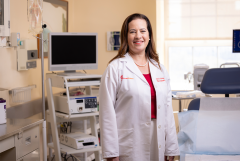Many women assume pelvic floor health issues are simply their fate—part of having vaginal deliveries, getting older, gaining weight or entering menopause. Perhaps they have watched their mothers and grandmothers live with symptoms, such as urinary incontinence and pain. Though pelvic floor disorders happen when the muscles and tissues that support the bladder, bowel and uterus weaken or don’t work properly, they are not a normal part of aging.
But the misconception—that nothing can be done—keeps women from seeking help.
“There are so many people suffering from this, but people don't talk about it and are often embarrassed,” said Dr. Larissa Rodríguez, chair of the Department of Urology and the James J. Colt Professor of Urology at Weill Cornell Medicine and urologist-in-chief at NewYork-Presbyterian/Weill Cornell Medical Center.
Part of the issue is making sure women know that treatments exist: pelvic floor physical therapy, behavioral strategies, medications, devices, procedures and vaginal estrogen, which can reduce urinary tract infections and improve urgency symptoms. In the absence of a well-known spokesperson who can raise awareness about pelvic floor disorders and inspire fundraising for research, Dr. Rodríguez spends time educating women and empowering them to talk to their doctors and seek treatment.







